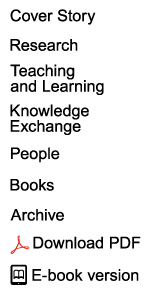“Throughout my career, Asia has kept calling me back,” said Professor Keith Richburg, the new Director the Journalism and Media Studies Centre (JMSC), when asked about the path that brought him to HKU.
American by birth, Professor Richburg has spent much of his journalistic career with the Washington Post, including three separate stints for them in Asia. In that time, he has covered several coup attempts in the Philippines, the Vietnamese withdrawal from Cambodia, the collapse of the Suharto regime in Indonesia, the Asian financial crisis and the handover of Hong Kong’s sovereignty in 1997. And, when he wasn’t covering Asia, Professor Richburg’s overseas career also spanned France, Africa, the Middle East and Afghanistan.
He now brings his extensive international experience to the JMSC, taking over the job of Director from Professor Chan Yuen-ying, who founded the Centre – initially working from a couple of rooms – in 1999. “I call it the House that Ying Built,” says Professor Richburg. “She did an extraordinary job, over the years she has developed its reach and reputation. I want to continue her vision, as well as taking the Centre in new directions.”
![]() When we have the ability to do live crossovers, I would like us to become the place in Asia that TV companies come to for opinions and interviews – and that is across the faculties. If they need an expert to talk to, I want them to think of HKU first.
When we have the ability to do live crossovers, I would like us to become the place in Asia that TV companies come to for opinions and interviews – and that is across the faculties. If they need an expert to talk to, I want them to think of HKU first. ![]()
Professor Keith Richburg
Punching above our weight
He’s particularly keen to build up the JMSC’s overseas connections via his extensive international contacts, both from his career on the Washington Post, and his academic network in the United States. “Outreach is a big part of what we can do. I would like to forge links with other universities – to leverage what we have. There is so much interest worldwide in what is going on in China that we can punch above our weight. Overseas students would welcome opportunities to come here and experience that first-hand.
“It’s a very interesting time to be in Asia, given the political changes across the region – especially in Thailand and the Philippines, the democratisation of Myanmar and, of course, Mainland China’s new place in the world – all those things are on our doorstep. And the world is watching.”
He has ambitions for the Centre’s standing within the region too. “I want the JMSC to be the premier institution for the next generation of journalists in Asia. In the US, if you want to do journalism, your first choice is Columbia, I want JMSC to be the first choice in Asia.”
But, initially, what he wants to do is listen – with academics, teachers, students and administrative staff within the JMSC – to find out what is going well and what could be better. “I am going to listen and learn, and say to people ‘tell me what you want’,” said Professor Richburg. “I’m a great believer in identifying problems and then figuring out how to go about solving them. As Roosevelt put it, ‘bold, persistent experimentation’.”
First steps will be to improve the physical environment of the JMSC. “I would like to introduce more TV screens throughout the building so that we have news channels on all day. We’re already making improvements to the radio studio, and I want to do the same with our TV studio.
“We should be able to do live TV crossovers. While here as a Visiting Professor I had to turn down invitations to do on-air interviews with the BBC and Al Jazeera because we don’t have the right facilities. But when we have the ability to do live crossovers, I would like us to become the place in Asia that TV companies come to for opinions and interviews – and that is across all faculties. If they need an expert to talk to, I want them to think of HKU first. We have the experts.”
He has already made some changes: “We are revising the basic news writing and reporting class, and looking at the rest of the curriculum too. We are not changing everything, but we are questioning everything to make sure we are covering all that we should be.”
Taking up the role of head of the JMSC brings Professor Richburg’s career full circle. When he first graduated from the University of Michigan he was torn between which way his career should go – academia or journalism. He chose the latter then, but when he retired from the Washington Post three years ago, began to reconsider his options and decided the time was right to switch to academia.
“I taught a study group on China at Harvard for one semester in 2013, then in 2014 did a spring semester at Princeton on international journalism. Basically, I got the teaching bug, and started to wonder how I could combine journalism and teaching.” Then last year he came to HKU as a Visiting Professor, and colleagues suggested he apply for the directorship.
“I’m very excited to be here,” he said. “I’m particularly thrilled that one-third of our students are Mainland Chinese who want to learn international reporting techniques. The opportunity to teach the next generation of journalists in Asia is too good to miss. And their reporting experience will start
here – I would like the JMSC to be a place that generates great journalism as well as trains great journalists.”

The Write Stuff
With more than 30 years of covering international news under his belt, the new head of the Journalism and Media Studies Centre Professor Keith Richburg brings a global vision to the role.
Next
Back


